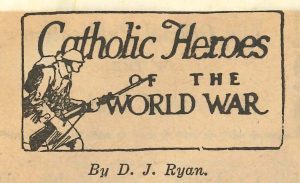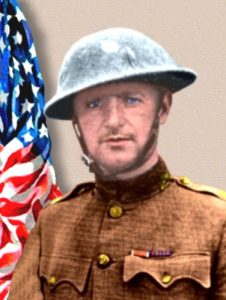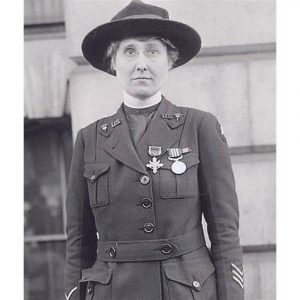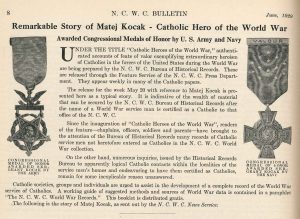
In his 1977 hit single ‘Heroes,’ David Bowie sang “We can be heroes, just for one day…We can be heroes, forever and ever.” He may just as well have been referring to the ‘Catholic Heroes of the World War‘, whose valor was chronicled in the American Catholic press, 1929-1933. This now obscure paean to Catholic veterans and war workers, decorated by their then grateful country, was rediscovered in 2015 by Catholic University archivists working to identify and digitize materials documenting American Catholic efforts for the 2017 centenary of the United States entry into the so-called War to End All Wars. Perhaps via digitization these “heroes, just for one day” can begin again to be recognized as “heroes, forever and ever.”
As a minority, American Catholic population percentages increased mostly through immigration, from one percent during the American Revolution, to seventeen percent in World War I, and twenty-two percent in the twenty-first century. Supporting America’s World War I effort was a watershed for Catholics, long viewed as having questionable patriotism. They responded under the motto “For God and Country” to create the National Catholic War Council (NCWC), forerunner of today’s United States Conference of Catholic Bishops (USCCB), representing Catholic interests in Congress and addressing the needs of soldiers and war workers. After the war, Catholics were confronted with the Oregon School Bill, supported by the Ku Klux Klan, declaring school age children could only attend public schools. The NCWC mobilized public opposition and the U.S. Supreme Court rejected the Oregon School Bill in 1925.

The 1928 American presidential election witnessed the first Catholic to head a major party ticket with Al Smith of New York as the Democratic Party nominee. He lost to Republican Herbert Hoover and it would not be until 1960 with John Fitzgerald Kennedy, that another Catholic would run, and this time win the presidency. Smith and Catholics were subjected to such vitriolic abuse that for Daniel J. Ryan, who headed the NCWC Bureau of Historical Records, it appeared work over the past decade to document American Catholic patriotism via war activities had been for naught. Never faint hearted and with records of over 800,000 Catholic veterans available, Ryan began in December 1928 to write a weekly column on outstanding ‘Catholic Heroes of the World War‘ for the Catholic press.
Ryan chose to profile men, and some women, who had won the Congressional Medal of Honor (CMH), the Distinguished Service Cross (DSC), and the Distinguished Service Medal (DSM). Included were Colonel William ‘Wild Bill’ Donovan, later the famed spymaster of World War II; nurse Beatrice Mary MacDonald, the first woman to win a DSC and Purple Heart; Daniel Daly of both the Knights of Columbus and U. S. Marines; Michigan chaplain Patrick R. Dunigan; El Paso native Marcus Armijo; and Italian immigrant Michael Vigliotti. Ryan kept a record of the stories with clippings in a scrapbook organized alphabetically by surname. The scrapbook itself was unremarkable, hard cover with yellow onionskin paper. The cover was acidic and falling apart, and many of the pages torn or disintegrating. The clippings were digitized and photocopied onto acid free paper, with the originals and copies individually housed in acid free folders.
The feature was well received by former servicemen, their families, and others, who noted the accuracy of the articles. It continued until 1933, ending perhaps not coincidentally, in the same year Franklin Delano Roosevelt, relatively friendly to Catholics, assumed the Office of the President, though it should be noted the NCWC decided to close the Bureau of Historical Records in 1934 citing lack of funds. Ryan had explained the series hoped to deal with Catholic heroes from every state and diocese, and by 1931 there were 141 stories covering the then 48 states and all but 7 Catholic dioceses. By the time the column ended in 1933 there were about 250 stories in all.¹ For more on American Catholics in World War I see the Catholic University online exhibit.
|
|
|
¹NCWC Bureau of Historical Records, Annual Reports, 1929-1933.


